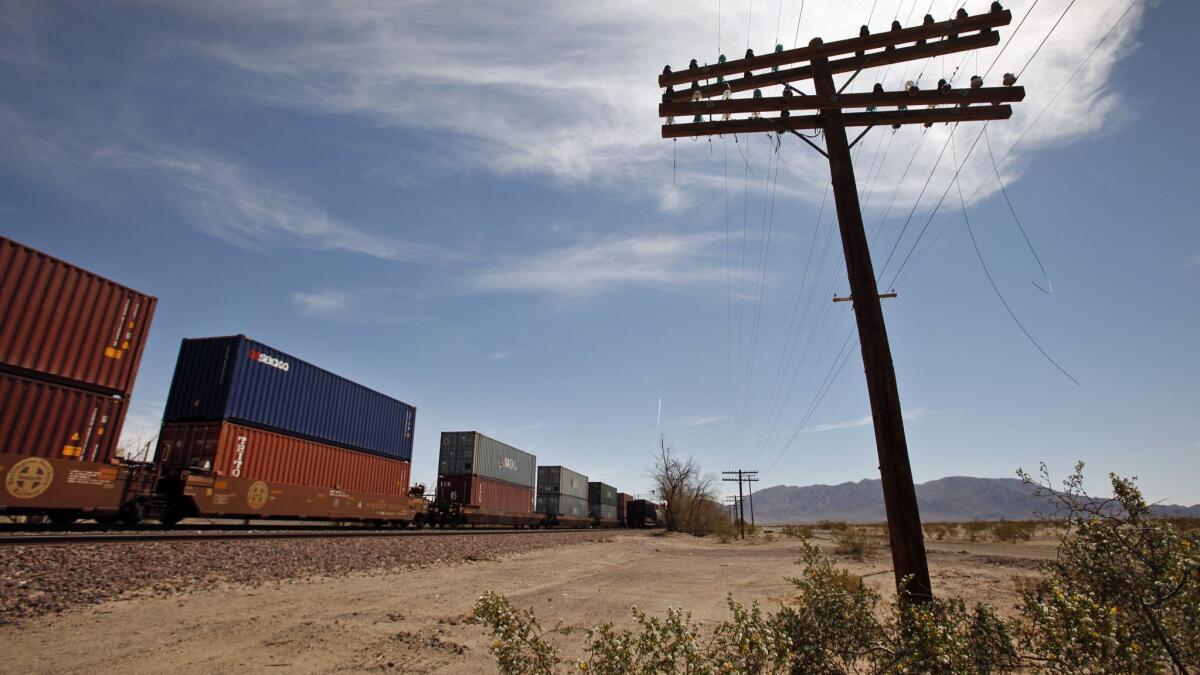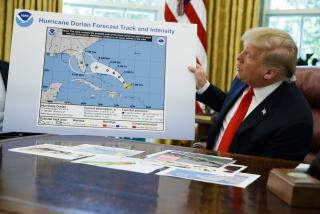Column: Trump cabinet sabotages its own policies through laziness, incompetence or both

Buried within a recent judicial ruling overturning the Trump administration’s approval of the largely pointless Cadiz water project are a few clues to why Trump’s policymaking is so often blocked in federal court.
The operative term is “arbitrary and capricious.” Its appearance in a judge’s opinion in a Trump-related case signals that an administration effort to overturn an Obama-era rule or policy is too lazy, incompetent or slapdash to stand.
That’s the foundation of the June 21 ruling by U.S. District Judge George H. Wu of Los Angeles. Wu found that the Interior Department hadn’t done the necessary groundwork to reverse the Obama administration’s rejection of a project that would arguably damage the ecology of the Mojave Desert — or at least that the agency had made its decision first and conjured up a rationale later.
The 2017 Determination made no attempt to rebut such facts, it simply discarded them.
— Federal Judge George Wu
Wu wrote that in its legal analysis supporting its reversal, the Trump administration “seemingly cherry-picks portions of different sources to craft a case for a directed/desired result.”
Wu noted further that an Interior Department functionary had ordered his underlings to “get rid of the Hillary [sic] opinion” (in fact, Hillary Clinton had nothing to do with it), and to “look at the facts, and write an opinion suggesting that the facts … were ignored” when the previous administration blocked the project.
The judge observed that Interior had not submitted a factual explanation for why it reversed a prior government decision, as the law required. That would make its action, yes, “arbitrary and capricious.”
Cadiz says it’s unfazed by Wu’s ruling, which it sees as merely an order that Interior provide more information. The company says it’s “confident” that the agency “will swiftly prepare an amended evaluation completely compliant with the court’s direction.”
We’ll get into more detail about the long-running saga of Cadiz and its political connections in a bit. What makes Wu’s decision interesting beyond Southern California is that it points to a pattern in Trump administration policymaking.
Put briefly, the administration often is so determined to reverse or sabotage an Obama policy that it bullheadedly assumes that all that’s needed is for it to say so. Federal agencies merely say they’ve come to a different conclusion from the Obama administration, and they think that’s enough.
The federal Administrative Procedure Act, however, requires more. If an agency desires to reverse a policy or regulation that was the product of painstaking groundwork and empirical data, it needs to build a commensurate factual record. Failing to do so, judges have ruled, exposes Trump’s actions to challenge under the law’s provision barring agency actions found to be “arbitrary, capricious [or] an abuse of discretion.”
Numerous Trump policies have foundered on this shoal. The Washington Post calculated in March that the administration had lost 63 federal court rulings, of which two-thirds involved the Administrative Procedure Act. The Institute for Policy Integrity of New York University has counted 39 cases in which a Trump deregulatory effort failed in court or was withdrawn in the face of a lawsuit, versus only three in which the administration prevailed.
These rulings are generally subject to appeal and may indeed be reversed by higher courts. But losses at the level of federal district courts often presage further legal difficulties ahead.
Trump hasn’t necessarily had a personal hand in these cases. But he’s the boss, and if he were capable of making sure that all the administrative “T’s” were crossed and “I’s” dotted, presumably he would do so.
Among the policies on which Trump has been stymied is his effort to rescind the Obama-era Deferred Action for Childhood Arrivals (DACA), which allows those brought illegally to the U.S. as children to remain; it’s been blocked by appellate courts in San Francisco and Richmond, Va., in decisions likely to be reviewed by the Supreme Court. Both courts found Trump’s action to be “arbitrary and capricious.”
In other cases, Trump’s efforts to rescind Obama regulations on air and water pollution and coal mining have been blocked. A federal judge also invalidated work requirements for Medicaid in Kentucky and Arkansas that had been approved by the Department of Health and Human Services on March 27.
In both rulings, U.S. District Judge James E. Boasberg of Washington, D.C., found that Health and Human Services Secretary Alex Azar hadn’t bothered to weigh evidence that the programs would throw thousands of people off the Medicaid rolls, or how that would affect the program’s mission to bring healthcare to low-income residents.
Most recently, the administration’s slipshod approach dealt it a major loss in the battle over adding a question about citizenship to the 2020 census.
Federal courts in California, New York and Maryland all found that Commerce Secretary Wilbur Ross had breached the Administrative Procedure Act in ordering the question to be added to the census. They variously found that his purported rationale — that the government needed the information to assist in enforcing the Voting Rights Act — was “cynical” (the Calfornia court), “manufactured” (Maryland) or “pretextual” (New York). His real goal was to undercount noncitizen and Latino residents by discouraging them from participating in the census. That could harm blue states with large immigrant communities by depriving them of congressional districts and reducing federal funding pegged to population.
On June 27 the Supreme Court effectively agreed, blocking the citizenship question. The majority opinion by Chief Justice John Roberts found that Ross had not violated the “arbitrary and capricious” standard. But he acknowledged that Ross’ rationale “seems to have been contrived” — which sounds like a polite way of saying that Ross lied. Roberts ordered the question off the census. The administration seemed to have accepted the setback until Wednesday, when Trump said he still wanted the question used, sending Justice Department attorneys scurrying to find an end-run around the Supreme Court decision over the Fourth of July holiday.
Turning back to Cadiz, the decision by Judge Wu implies a similar effort to graft a factual argument onto what is fundamentally a decision grounded in partisan politics.
Cadiz Inc., as we’ve reported, is a politically well-connected company that has tried for years to win approval for a highly dubious water project in the Mojave Desert. Its idea is to store water under its 34,500 acres of desert property, and pump it out, along with existing groundwater, for Southern California users in dry periods. Getting the water project built is Cadiz’s only significant business prospect; it’s sustained chiefly by borrowing and private equity placements, and recorded losses totaling more than $60 million in 2017 and 2018 alone.
Environmental experts have consistently raised questions about the ecological damage that might be caused by a pipeline carrying the water out of the desert. The Metropolitan Water District of Southern California, which Cadiz originally envisioned as its prime customer, backed away in 2002.
Cadiz then crafted a new proposal involving a route over an existing desert right-of-way held by the Arizona & California Railroad. The company argued that using the existing right-of-way meant that the pipeline would be exempt from further environmental review.
During the Obama administration, the Interior Department’s Bureau of Land Management doused that idea with cold water. The BLM ruled that the right-of-way exemption applied only to projects with a “railroad purpose,” and that pumping water to the coast for commercial users didn’t qualify.
Then the Trump administration arrived. The Trump transition team had placed the Cadiz project on a list of “emergency and national security projects” it favored. Less than two weeks after the inauguration, a political official at Interior, James Cason, had a video conference with two Cadiz lobbyists; the agency’s political staff, Wu noted, subsequently held meetings with Interior officials over Cadiz.
Cason presently issued the orders to reverse the Obama-era decision. A new decision was duly issued, supporting the Cadiz position that the pipeline was sufficiently connected to a railroad purpose to justify its approval by the BLM.
Wu notes that the current Interior secretary, David Bernhardt, was formerly a lobbyist for Cadiz. Most of the events covered in his ruling occurred before his appointment as secretary and even before his earlier appointment as deputy secretary, which Trump made April 28, 2017. Bernhardt filed a pledge to recuse himself from Cadiz-related matters at Interior, which Wu took at face value. Still, the Bernhardt connection is only one of a long list of political connections Cadiz has enjoyed over the years, including former California Gov. Gray Davis and former Los Angeles Mayor Antonio Villaraigosa.
Wu didn’t conclude whether the Trump administration’s decision on the Cadiz pipeline was correct or incorrect. But what struck him about the government’s about-face was the absence of any factual backup. The Trump-era ruling “provides no explanation for reversing the 2015 Determination” made under Obama, he observed, even though the two documents are directly contradictory.
The 2015 document explained in detail the facts underlying its conclusion that Cadiz didn’t deserve an exemption; “the 2017 Determination made no attempt to rebut such facts, it simply discarded them.” He directed the BLM, essentially, to show its work.
Whether Wu’s ruling is just a bump in the road for Cadiz can’t be predicted. “We have no bone to pick with this outcome,” its chief executive, Scott Slater — a former law partner of Bernhardt’s — told me. The BLM, he says, “already did the work” to back up its reversal of the Obama ruling, and “simply needs to explain why it did what it did, which is not a significant burden.”
Cadiz is a good example of the Trump administration’s inability or disinclination to present a proper case for its policies. The water project, which has made little noticeable headway for more than 15 years because of doubts about its necessity and environmental impact, resembles Trump initiatives on which experts and the public show grave doubts, such as work rules for Medicaid and cancellation of DACA. For opponents of all those projects, the administration’s ineptitude might even be good news.
Keep up to date with Michael Hiltzik. Follow @hiltzikm on Twitter, see his Facebook page, or email [email protected].
Return to Michael Hiltzik’s blog.
More to Read
Inside the business of entertainment
The Wide Shot brings you news, analysis and insights on everything from streaming wars to production — and what it all means for the future.
You may occasionally receive promotional content from the Los Angeles Times.











